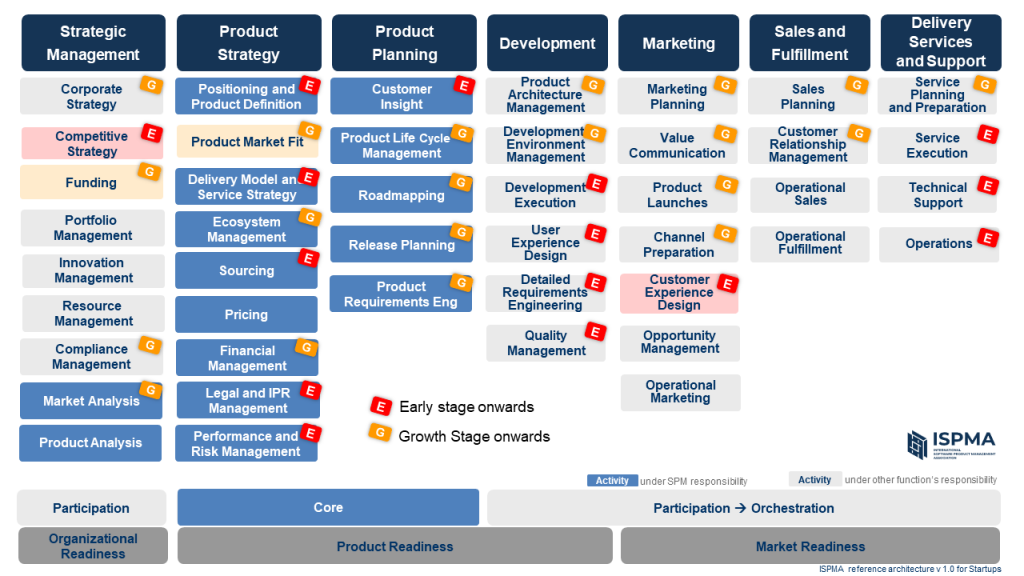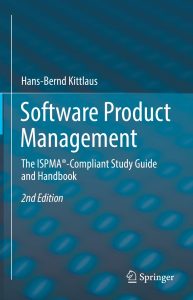For more than 10 years, the non-profit organisation ISPMA® – International Software Product Management Association e.V. (www.ispma.org) – has been helping software product managers with its SPM Body of Knowledge which is the basis of training and certification. Now ISPMA® has extended this knowledge base with the new module „SPM for Startups“.
The corresponding training is intended for participants who are involved in software product management in startups or in startup-like units of established companies. They can be founders, software product managers or in other roles.
The purpose of software product management in a startup is to devise, conduct and execute experiments and fine-tune the business model using the learnings from each of such iterations. In the context of software product management, startups include all the three variants below who embark on the journey of building a new product to address a pressing problem of a market segment:
- Bootstrapped startups: startups without external funding
- Funded Startups: startups with external funding
- Innovation Labs / New Product Businesses inside mature companies in a startup-like mode
We differentiate startups in three specific stages:
- Early stage startups
- Growth stage startups
- Scale-ups
The Early Stage is focused on finding the right problem-solution fit which aims at deriving a minimum feature set in which to launch a minimum viable product, an MVP, which is to be the subject of learning and iterated upon toward solving the customer’s confirmed problem. The Growth Stage is focused on finding and optimizing the product-market fit using an iterative approach. The steps of an iteration are as follows: hypothesis – MVP – test – conclusion. We define MVP as: „The minimum feature set of a new product that is derived through a learning phase and that some customers are willing to pay for in the first release.”
This module for software product managers in startup situations provides the tools that help make the job more effective, reduce the inherent stress, and make the organisation more successful. It addresses the management of both software products and embedded software, i.e. software parts of software-intensive products. It covers all elements of the ISPMA® SPM Framework for Startups.
Elements of the Framework which are not marked as E or G are not relevant in the early and growth stages of a startup. Some elements are already relevant in the early stage (E), some only become relevant when a startup enters the growth stage (G). In the Scale-Up Stage all elements of the SPM Framework are relevant. Some topics need special attention in the Early and Growth Stages of a startup. They are added as elements to the framework. Competitive Strategy and Customer Experience Design apply from the early stage of the startup while Funding and Product-Market Fit from growth stage onwards.
Version 2 of the ISPMA® Curriculum
In parallel to the new module „SPM for Startups“, ISPMA® has also published new versions and releases of the proven SPM Framework and the following modules:
- “SPM – The Foundation”,
- “Excellence in Product Strategy” and
- “Excellence in Product Planning”.
The new syllabi are available for free on the ISPMA® Web Site (https://ispma.org/framework/syllabi/). The most important new elements in the different areas of software product management are:
- Product strategy:
- Stronger focus on offering architecture, i.e. the structure of the product offering
- Management of innovation and transaction platforms
- Update of legal aspects
- Product planning:
- Stronger focus on customer insight, i.e. gaining information on needs and expectations of customers, their jobes-to-be-done and the way they use the product
- In addition to the requirements-driven approach to product planning two newer approaches are covered:
- Data-analysis-driven: conducting experiments and analysis of resulting data, e.g. A/B-tests
- Data-input-driven: Collecting and preparing data sets which are used as inputs to machine learning engines for the learning process
Product managers need to master all three approaches in the future.
- Strategic management:
- Compliance management for both legal and regulatory requirements as well as requirements in the areas os sustainability and ethics
- Orchestration
- Development: stronger focus on the cooperation of product managers and architects; DevOps
- Marketing: stronger focus on value communication
- Service and Support: stronger focus on product-related services as part of the whole product offering
- A lot of smaller enhancements and changes
These are the biggest, but still evolutionary changes in the history of ISPMA®. All these changes have already been incorporated in the new edition of the SPM book
Hans-Bernd Kittlaus: Software Product Management – The ISPMA®-Compliant Study Guide and Handbook, 2nd Edition, Springer 2022 (https://www.innotivum.com/de/publications/spm-book/)




